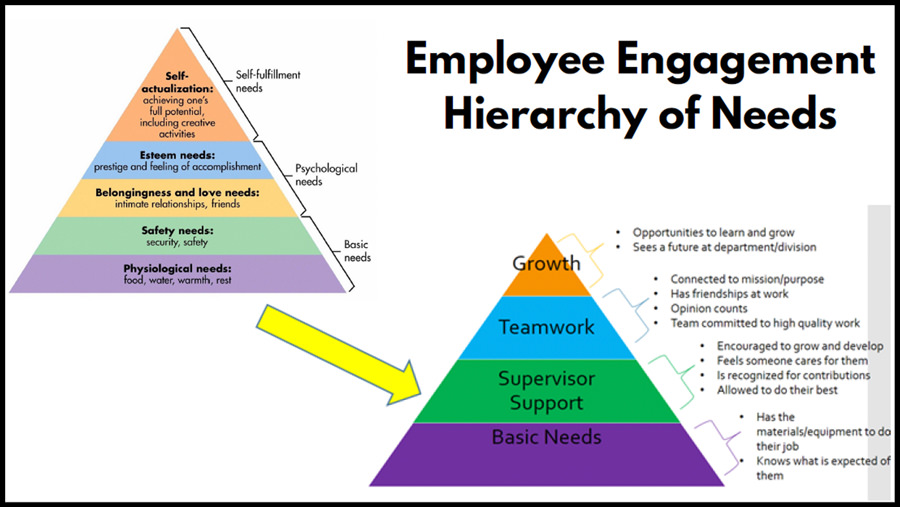
By Amanda Morrow, SHRM-CP, Human Resources Business Partner, Rice University
with editing contributions from Melinda English, Rebecca Gould, and Susann Glenn
Panic
Over one year ago, the isolated whispers of a novel coronavirus grew into a boisterous, full-blown pandemic alarm that reverberated across the globe. As a result, universities and colleges worldwide were suddenly tasked with leading their staff, faculty, and students through unprecedented challenges and unforeseen complications. We, here, at Rice University in Houston, Texas, were no exception.
On March 5, 2020, our Crisis Management Team alerted the campus that a staff member who had been under quarantine with a possible case of the coronavirus has tested positive for the disease. While swift action was taken to isolate the affected individual and those with whom they had contact, this news catalyzed sudden and wide-reaching action across campus. As the implications of SARS-CoV-2, a highly contagious, airborne disease, began to take form, the Human Resources (HR) team sprang into action. Our team immediately began supporting efforts to close down the campus to only essential personnel; to provide critical guidance to supervisors as they sent most (if not all) of their employees-home to work fully remote; to redesign how work was being performed; and most importantly, to provide crucial communications in an ever-changing situation. Above all, every action taken was to serve two primary objectives: to ensure the health, safety, and well-being of the Rice community and to ensure the continuation of Rice’s mission. In short, to foster pathbreaking research and unsurpassed teaching, enabling our staff, faculty, and students to better our world.
I’d like to share several of our Covid-response outcomes with you and describe how those outcomes have empowered and informed over one hundred supervisors. Transparency, tackling difficult questions, and creating calls-to-action are a few of the ways we kept employees engaged during a tumultuous time. Although the situation continues to change, we have settled into a new normal and our regular meetings have shifted to focus on leadership development. Below I walk you through how we waded through panic and triage to arrive at a place where our leadership is stronger than ever before.
Triage
Necessity is indeed the mother of invention and the COVID-19 pandemic led to a much-welcomed and desperately needed innovation: a weekly Supervisor Update. Beginning Friday, March 20, 2020, our HR team began to host weekly, hour-long Zoom sessions for over one hundred Rice staff, faculty, and administrators to provide critical guidance and timely communications (often with the subject matter experts). Your institution probably dealt with similar topics; our sessions covered topics and questions across an ever-widening range as the requisite response to COVID-19 expanded:
- Campus COVID-19 testing plans and protocols
- New, more robust campus cleaning procedures as outlined by the CDC
- Self-Health Checklist and reporting process
- Calculating and ordering the right amount of cleaning supplies and physical protective equipment (PPE) for a building, department, or division
- Possible benefits implications and options for sick leave and other COVID-related absences or accommodations
- Timekeeping practices for those affected by COVID-19
- Completing and submitting department and division work plans to reduce immediate headcount on campus while shifting to a primarily remote workforce, including implementing physical distancing and mask measures, alternating schedules, and formalizing work from home arrangements
- Maintaining employee engagement and supervising teams effectively in a remote setting, including the administration of campus-wide surveys to assess remote working arrangements and employee well-being
- Financial implications of COVID-19 for the university and its impact on hiring
- Phased return to campus of critical functions
- Working with supervisors and senior leaders to develop work plans between supervisors and employees to ensure expectations were clear and attainable
We created a guidebook that began as a triage response to efficiently push out critical information, but soon became something much more – a lifeline in a world that had essentially shut down overnight. Our HR Business Partner team, led by Melinda English, Director of Organizational Change and Strategic Initiatives, partnered closely with Susann Glenn, our Director of Communications, to create a comprehensive guide that addressed many of the topics weighing most heavily on campus minds. Over time, updated information has been made largely accessible on our dedicated coronavirus university website.
In addition to building and sharing critical resources, we recognized the importance of creating a space where administrators felt comfortable asking questions. As these were early days in 2020, Zoom meetings of this size were still new territory to most of us. We grappled with the usual technical difficulties (“Please mute yourself if you are not speaking”). We gradually utilized more of the platform’s features to include pulse surveys and word clouds (using other collaboration tools) to “temperature check” our attendees. In addition, allowing attendees to submit private, anonymous questions through the chat feature directly to a dedicated chat monitor engendered trust by letting them voice their concerns openly and without fear of reprisal.
Service-Strategy-Results
Over time, these sessions began to solidify in structure. We shifted our focus to our Human Resources team priorities of “Service-Strategy-Results.” How could we strategically continue to serve our community of leaders to effect lasting change that endures after the pandemic? We began to include guest speakers such as members of our Crisis Management Team, our Vice President of Administration, and Benefits, to provide pertinent updates and respond to the attendees’ questions. As these responses grew, a corresponding website expanded to capture new and updated information that could be easily accessed.
Alongside these efforts, Zoom sessions were recorded with attendee consent to allow future access for attendees and for those unable to attend. A weekly email followed each session, providing critical links and information and the information for the next Zoom session. Below are examples of the FAQs and supporting resources we published under the newly minted “Supervisor Hub,” a supervisor-only accessible landing page on our website. We began to pool sources for various topics, including Weekly Development Topics to support our new “work from home” employee population.
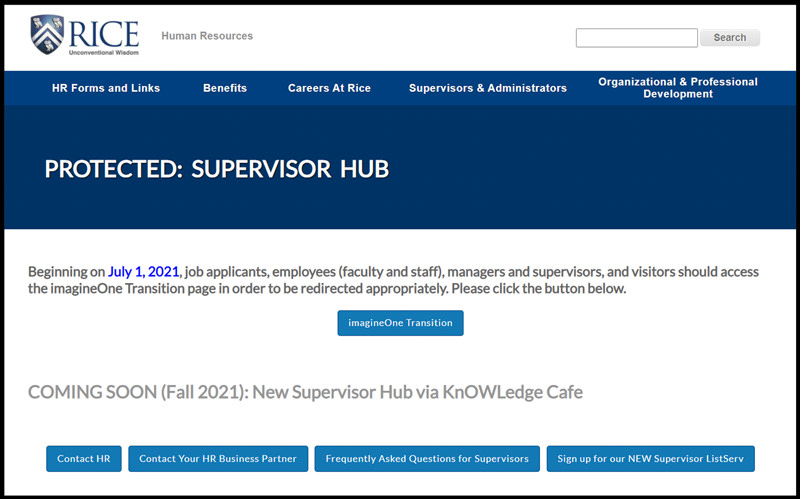
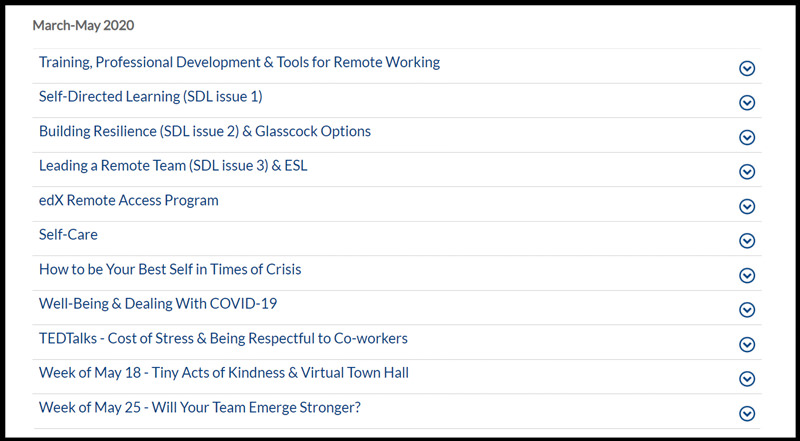
Gradually, the weekly updates began to engage supervisors more directly for their own tried-and-true best practices, becoming a forum for them to share how they managed their teams through uncertainty. We also used these sessions to host a representative from our Employee Assistance Program (EAP), providing guidance and information to support those supporting everyone else.
Eventually, we undertook a gradual, staged return to campus, emphasizing reduced physical presence on campus and observing newly established campus safety protocols. Our Crisis Management Team (CMT) played a critical role in managing the safety and well-being of employees and students both on and off-campus. For example, signage was posted at every campus entrance and within buildings and meeting spaces, return to campus training was required, and a rigorous, recurring testing schedule was created to correspond with those returning to campus. In addition, the HR team did as much as we could to support the incredible efforts of our CMT. This support included communicating COVID-19 updates at our weekly supervisor Zoom calls and creating supporting FAQs and other information to help supervisors and employees navigate the return to campus and continuation of work.
The Silver Lining
It would have been easy (and understandable) to have lost hope during the struggle and focused on our own work and stressors. Fortunately, this past year (although tough in many aspects) demonstrated that teamwork, agility, and resilience are stronger than COVID-19. There were several ways the HR team stepped up by partnering with campus leaders, developing processes and procedures, communicating important information, and, most importantly, creating a community of supervisors to support the campus community.
Although no one would ever ask for a crisis situation to navigate, the unintended consequence of a weekly Supervisor Update in the wake of the COVID-19 pandemic was creating a recurring, visible presence and sense of connection across campus, effectively shining a spotlight on this team and providing a golden opportunity to support and grow trust with our supervisors. A small HR team can only extend so far, but empowering and informing over one hundred supervisors every week to take information and insight back to their teams has a much further reach and impact.
What Have We Learned?
Transparency
Employees appreciate transparency. Often, they will have questions that are still unanswered. Being clear on what we know and openly admitting what we don’t goes a long way toward building trust. Reassuring our leaders that we were striving endlessly to support them and to provide a clear path forward during a period of murkiness counts for something, right? An example of such transparency was a specific meeting when our Director of Institutional Crisis Management acknowledged the group and how much their time and energy was appreciated. Additionally, she recognized the toll that COVID was having on everyone and displayed true vulnerability and emotion as she reminded everyone that “we are learning as we go” and that there will be mistakes, as well as insights and learning from those mistakes. Difficult Questions
Planning is essential. Knowing what employees will want to know and providing an FAQ in conjunction with the meeting is incredibly beneficial. This FAQ continuously evolved as more information became available. Inviting Subject Matter Experts (SMEs) to attend who were most knowledgeable about pressing issues on the minds of our employees was critical. Knowing when to place a question in a parking lot, and ensuring a follow-up after the meeting, helped us manage dozens of jostling questions and kept our meeting on track. In addition to the excellent SMEs on the call, we also invited other guests. One of our directors (and retired brigadier general) spoke about leading others in times of crisis (something this individual knows very well), while another director taught us about proper workspace ergonomics, and a recreation center employee led us through some at-home stretches. Calls to Action
While the information delivered at these calls was helpful (supported by our consistent attendance rates), we saw an opportunity to focus beyond providing information; we also focused on supporting supervisors in managing a remote workforce. Therefore, in most of our calls or post-call emails, we provided supervisors with specific calls to action, articles, and other helpful information. Ideally, a simple action anyone can take that could have a great impact:
“In the next week, reach out to your team members one-on-one just to check in on how they’re coping- do they have what they need to do their work? Are they encountering unknown obstacles at home? Do they need to adjust their priorities and deadlines? Be prepared to share what you learned next week.”
“This week, revisit your team’s projects and deadlines. Now that a lot of us are juggling at-home commitments with working, where can you realign your team’s priorities? What is mission-critical? Can the new project wait? What can you stop doing for now, and what can you stop doing forever?”
Life After 2020 – From Supervisor Triage to Leadership Development
As work life began to shift into our “new normal,” our team began to outline a new format and approach for our once-weekly Supervisor Update. No longer a “triage,” these sessions focus on a curriculum designed to meet teams’ needs while developing their leaders. The new structure provides a monthly, 90-minute session on a leadership-focused topic. Each session prominently features renowned guest speakers from our own campus who share their own experiences as leaders. Lastly, the sessions still incorporate critical HR updates that so many crave. These sessions are further complemented by emails with supporting resources to include articles, videos, developmental or learning opportunities, and to document HR updates. The formula for our newly minted “Leadership Huddle” was solidified:
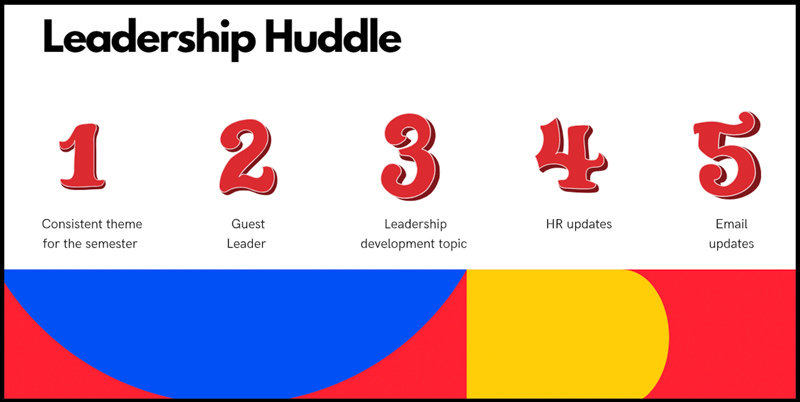
Recognizing the challenges of working remotely in some indefinite capacity, the focus of the 2021 monthly sessions is “Employee Engagement.” We thought this topic would serve as an excellent foundation on which to build. Our hope through these monthly calls is to provide supervisors with bite-sized development topics, introduce them to leaders across campus, and continue to foster a community of supervisors on campus. This semester’s monthly topics are based on the Gallup G-12 Engagement Survey and Maslow’s Hierarchy of Needs. We introduced the foundation of “Basic Needs” in November 2020 and are now moving through subsequent sessions regarding “Supervisor Support,” “Teamwork,” and “Growth.” Recognizing that working remotely will likely continue for the foreseeable future and become the “new normal” for many, we hope this series will capitalize on the benefits of offering that workplace flexibility while still equipping leaders to engage and develop their teams.
Although time will truly tell the success of this new initiative, our team intends to garner feedback from attendees through surveys as well as monitoring attendance numbers as we shift into this new direction. While it may be tempting for supervisors to put “leadership” on the back burner in favor of putting out day-to-day fires, truthfully, real leadership is more critical now than ever before. The “Basic Needs” criteria is deceptively simple, as these two questions can unearth a lot of the discomfort that our employees are managing every day:
- Do your employees have the materials/equipment to do their job?
- Do your employees know what is expected of them?
Even long-tenured employees have found themselves working in new environments and in different ways, so none of us can afford to take these assumptions for granted. Only when base needs are met can any of us hope to advance toward true engagement, teamwork, and growth. Helping our supervisors understand their critical roles in supporting their teams exponentially yields greater results. In other words? HR cannot strong-arm teams into performing better, particularly in such trying times as these. But HR can support the supervisors, who can support their teams, and get the results.
Leadership Huddle Attendee Testimonials
“The weekly supervisor meetings were highly beneficial for me, as they helped me manage my staff who were all working remotely during the pandemic. Not only did these meetings help me stay informed on the latest university news, initiatives and policies, but they also provided great forums to hear from terrific guest speakers, ask questions, share ideas, and learn from both experts and my peers. I also appreciated their follow-up emails with links to relevant resources and recordings of these meetings. I am grateful that our Rice HR team will continue to provide excellent content and resources for supervisors through the leadership huddles.”
– Jody Sommer, Senior Director of Operations, External Relations, Jones Graduate School of Business
“It was so helpful having that lifeline with Human Resources each week to get past the rumor mill and obtain factual information that I could pass on to my staff who were one of the first groups to return to campus last May.
Staff were initially quite apprehensive about returning to work, while safeguarding theirs and their family’s health. Being able to provide weekly updates concerning campus Covid protocols, mental health wellness tips while working remotely and implemented Covid testing procedures, removed the fear and presented staff with a solid base of support and assurance to return and restore resources and services on our campus.
Beginning in January 2021 weekly meetings became monthly meetings that were theme based as well as continuing to be informational. This provided supervisors with just the right amount of need-to-know campus information while adding development opportunities to learn from campus leaders about topics including providing feedback, employee engagement, and the importance of teams. It has frequently brought names, faces and shared work experiences to the forefront, that most supervisors would never have known.”
– Susan Garrison, Access Services Manager/Education Librarian, Fondren Library
“It truly would be impossible to understate the vital importance of Rice’s Weekly HR Supervisor Meetings. The Susanne M. Glasscock School of Continuing Studies is one of eight Schools at Rice. Within Glasscock, we have nine different departments, three degree programs, more than 400 annual offerings, 50+ employees and approximately 18 thousand annual enrollments. Under the best circumstances, ensuring all involved–staff, instructors and students–are fully informed and acting within directed guidance requires a colossal effort. That effort expands exponentially in uncommon circumstances, which have been all too common in Houston over the last several years. This was exemplified in the last 18 months as we navigated unprecedented events: the 2020 global COVID-19 pandemic and the 2021 ice storm.
In navigating such fluid situations, these weekly touchpoints allowed us to create custom direction for our unique student body, while also remaining within the overall guidance of the university as a whole. Through this process, we were able to ensure that our leadership team had current information to create and revise policy, our staff was up-to-date on current requirements and upcoming expectations, and our students were informed and encouraged by the steps we were taking as an organization.
Additionally, this forum allowed for two-way communication so that we could provide insights from our school’s perspective that were of value to the university. In particular, as we already had established remote work policies and practices, we were able to provide knowledge toward best practices and avoidable pitfalls. This was also true in regard to “Zoom” usage, which the Glasscock School had been utilizing for remote school and work two years prior to 2020.
Finally, the Weekly HR Supervisor Meetings served as a template for us for creating other vital meetings within the school during this turbulent time. Lessons learned through these meetings became an invaluable resource for establishing “Town Hall” meetings within Glasscock, allowing us to maintain morale, community and cohesion.
The Weekly HR Supervisor Meetings kept us informed, safe and moving forward as a school, which helped us do the same for our students, allowing them to stay on track with their educational aspirations.”
– Anne K. Santos, HR Administrator/Executive Assistant to the Dean, Glasscock School of Continuing Studies
Closing remarks
Despite a pandemic, rigorous testing, safety protocols, and working from home, the mission of Rice University remains unchanged. It is insufficient to “survive” or “make do” during these times. Instead, we seek to leverage our hardships into lessons learned and battles hard-won. While no one on our team expected a direct line of communication with our leaders across campus, the COVID-19 pandemic provided just that. We intend to take full advantage and continue to grow our burgeoning relationships with a campus committed to our RICE values: Responsibility, Integrity, Community and Excellence.
Truthfully, the collective experience of working during COVID-19 has exposed a number of existing challenges in our workplace. We were forced to recognize our workforce as human beings with lives outside of campus. Now we seek to continue to engage our employees more completely, as human beings, both at home and on campus. I invite you to ask yourselves some of the same questions we have pondered:
- What avenues already exist for contact with campus leadership? Can we expand these to include offerings more focused on leadership development?
- Are leaders hungry for development, or are they looking for educational entertainment or a quick fix?
- What did leaders do well during the pandemic, and what vulnerabilities did it expose?
- How can we best equip our leaders to leverage any ground gained during this troublesome time?
- How can we transform leadership across campus from putting out fires to proactively empowering their team members?
- Are leaders meeting teams’ basic needs, so that we can focus on teamwork and growth? Or do we need to start at the very beginning? Where do want to end up years from now, so we can lay the path out now?
Our Leadership Huddle is continually evolving, as needs and conditions change. This year, we are shifting our focus from helping teams survive to empowering them to thrive. Our new Leadership Huddle series, “Developing Mindsets, Not Skillsets,” asks leaders to move focus from putting out team fires to consider leadership at the source: their own personal growth. We have learned that you can never take a foundation for granted, and it’s best to start at the beginning. Where can you begin?
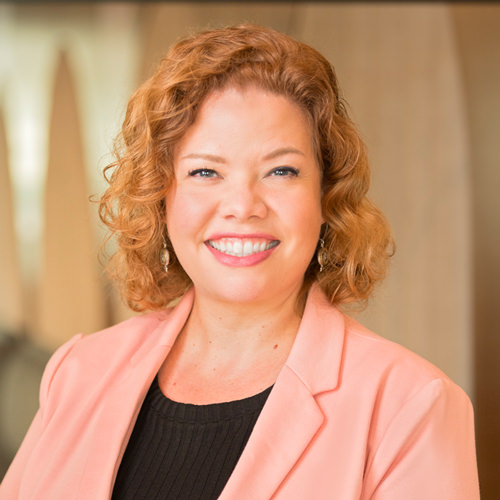 Amanda Morrow joined Rice University in 2020. As a Human Resources Business Partner, she works closely with her divisions’ leadership in all areas of talent management, including recruiting, hiring, and onboarding, as well as performance management and strategic HR initiatives. Amanda previously spent 7 years in various HR roles at Pinnacle, a reliability analytics firm, and Bureau Veritas North America, a global leader in testing, inspection, and certification. Amanda holds a Bachelor’s degree in Music from the University of Kentucky and a Master’s degree in Music from Rice University. Additionally, she obtained her Certified Professional designation from the Society for Human Resource Management (SHRM-CP).
Amanda Morrow joined Rice University in 2020. As a Human Resources Business Partner, she works closely with her divisions’ leadership in all areas of talent management, including recruiting, hiring, and onboarding, as well as performance management and strategic HR initiatives. Amanda previously spent 7 years in various HR roles at Pinnacle, a reliability analytics firm, and Bureau Veritas North America, a global leader in testing, inspection, and certification. Amanda holds a Bachelor’s degree in Music from the University of Kentucky and a Master’s degree in Music from Rice University. Additionally, she obtained her Certified Professional designation from the Society for Human Resource Management (SHRM-CP).


